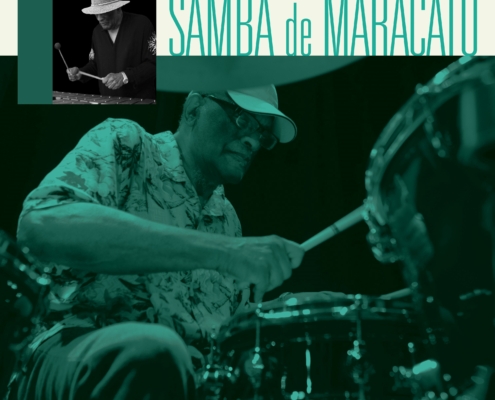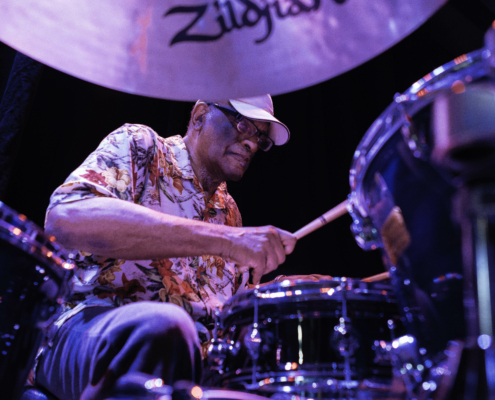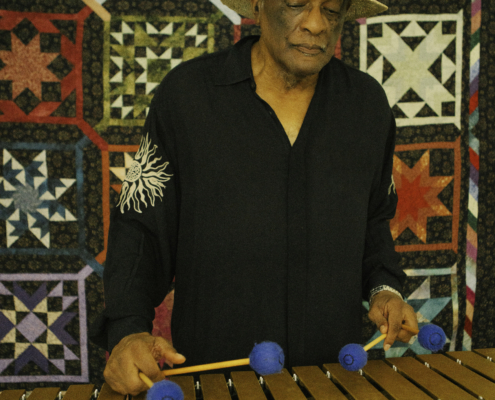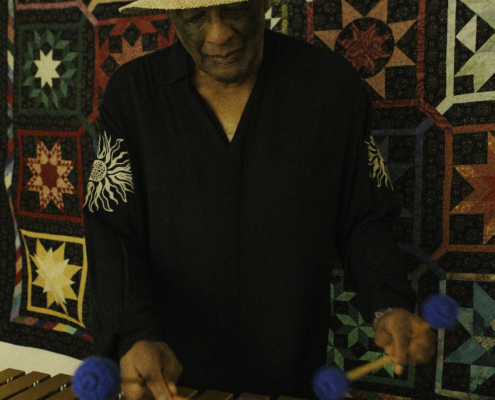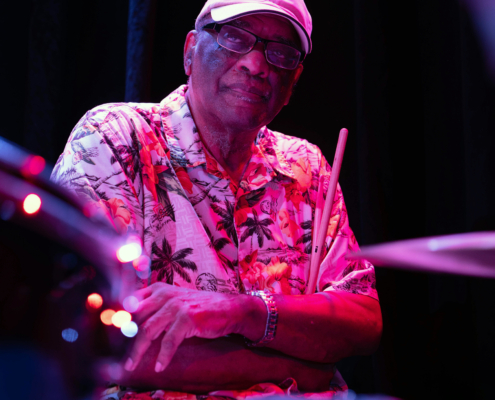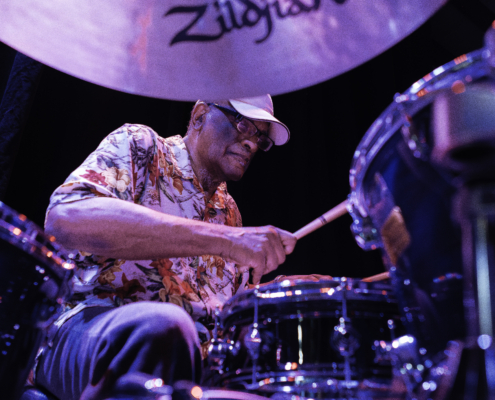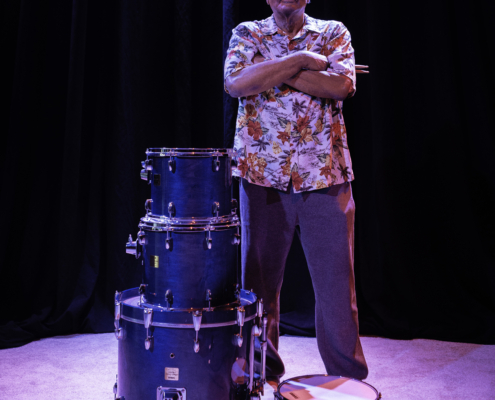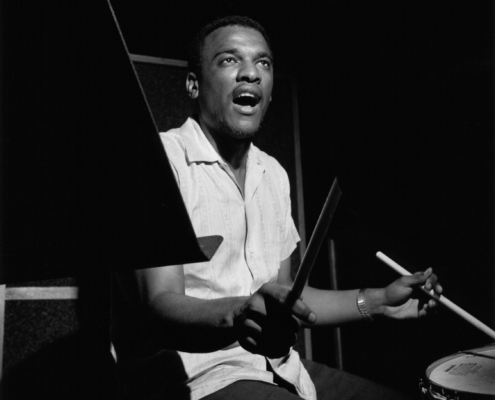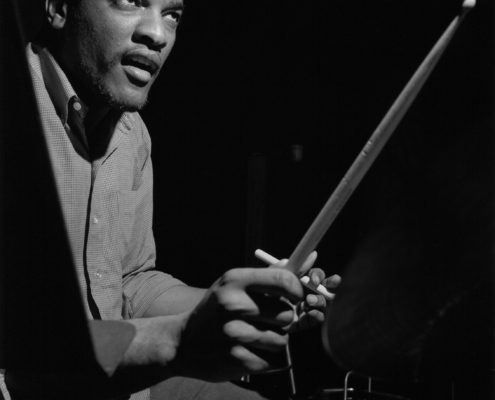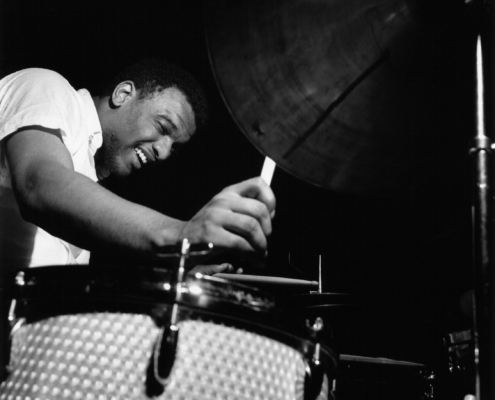Joe Chambers – Samba De Maracatu
- You And The Night And The Music (Arthur Schwartz/Howard Dietz)
- Circles (Joe Chambers)
- Samba De Maracatu (Joe Chambers)
- Visions (Bobby Hutcherson)
- Never Let Me Go (Jay Livingston/Ray Evans)
- Sabah el Nur (Karl Ratzer)
- Ecaroh (Horace Silver)
- New York State Of Mind Rain (Joe Chambers/Fenton Chambers)
- Rio (Wayne Shorter)
Drums, Percussion, Vibraphone: Joe Chambers
Piano, Synthesizer Programming: Brad Merritt
Bass: Steve Haines
Vocals: Stephanie Jordan (5)
Rap Vocals: MC Parrain (8)
Schlagzeug-Legende Joe Chambers war auf vielen stilprägenden Blue-Note-Alben der 1960er Jahre vertreten, darunter Wayne Shorters „Adams Apple“, Bobby Hutchersons „Components“, Freddie Hubbards „Breaking Point“, Joe Hendersons „Mode for Joe“, McCoy Tyners „Tender Moments“ und viel mehr. Es dauerte jedoch bis 1998, bis der vielgefragte Sideman mit seinem Album „Mirrors“ sein eigenes Blue Note-Debüt als Leader gab. Jetzt kehrt der Schlagzeuger, Percussionist, Vibraphonist und Komponist mit Original-kompositionen, Standards und Stücken von Wayne Shorter, Bobby Hutcherson und Horace Silver zurück, einem Album, auf dem er sich als Multi-Instrumentalist auch teilweise mehrfach selbst begleitet. Zeitloser Modern Jazz und eine wunderbare Blue-Note-Rückkehr.
INFO
Samba de Maracatu marks the notable Blue Note Records return of a significant figure in the label’s history: multi-instrumentalist, composer, arranger, and educator Joe Chambers. Although his Blue Note debut, “Mirrors”, came out in 1998, his association with the label is much deeper.
In the mid-to-late 1960s, Chambers played drums for numerous Blue Note luminaries appearing on some of the decade’s most progressive albums including Wayne Shorter’s “Adam’s Apple” and “Etcetera”, Bobby Hutcherson’s “Components” and “Happenings”, Freddie Hubbard’s “Breaking Point”, Joe Henderson’s “Mode for Joe”, Sam Rivers’ “Contours”, Andrew Hill’s “Andrew!!!”, Donald Byrd’s “Fancy Free”, and many more.
The label’s owners – Alfred Lion and Francis Wolff – offered Chambers a chance to record his own album for the imprint during this fertile period. Chambers, however, was riding so high on recording and touring with so many jazz greats that he declined the opportunity. He nevertheless etched a legacy as a distinguished and versatile jazz artist, capable of playing with Max Roach’s groundbreaking, percussion-only ensemble, M’Boom, as well as recording his own acclaimed albums as a leader on the Muse, Candid, Savant labels.
“Samba de Maracatu” shares similar characteristics with his previous 2016 album, “Landscapes” (Savant), on which Chambers overdubbed himself playing drums, vibraphone, marimba, piano, congas, bongos, and synthesizers while interacting with bassist Ira Coleman and pianist Rick Germanson. While crafting “Landscapes”, Chambers took inspiration from Bill Evans’ 1963 LP, “Conversations with Myself”, on which he created multiple contrapuntal piano lines by overdubbing himself. On “Samba de Maracatu”, Chambers applied a similar approach this time with the accompaniment of pianist Brad Merritt and bassist Steve Haines — two exceptional North Carolina-based jazz musicians.
On “Samba de Maracatu”, Chambers asserts himself more as a mallet player, particularly on the vibraphone. Throughout the album, he uses the vibraphone as the lead melodic and improvisational voice that often converses with Merritt’s remarkable piano accompaniments and solos. The title track, a Chambers original, highlights both his mastery on the vibraphone and his affinity for Brazilian rhythms. The song’s title references the syncretic Afro-Brazil rhythms, originated from Brazil’s Pernambuco province. The rhythm also has roots in the Afro-Brazilian Candomblé religion.
While “Samba de Maracatu” isn’t a Brazilian jazz album in this strictest sense, Chambers utilizes various rhythms and indigenous Brazilian percussion instruments on several pieces. On the sterling revisit of “Circles,” a suspenseful composition he wrote for M’Boom in the early-70s, Chambers drives the momentum with an abstraction of Brazil’s bione rhythm, while on the adventurous take on Wayne Shorter’s “Rio” he employs an infectious bossa nova rhythm toward the end.
Elsewhere, Chambers illuminates his artistry with standards. The album begins with a delightful reading of Arthur Schwartz and Howard Dietz’s Broadway standard, “You and the Night and the Music.” Later, Chambers invites New Orleans-based vocalist Stephanie Jordan to sing lead on a lovely rendition of Jay Livingston and Ray Evans’ “Never Let Me Go,” an enduring classic, made famous by Nat King Cole. Then there’s the cinematic take on Karl Ratzer’s 1998 modern jazz composition, “Sabeh el Nur.”
The album also features a glowing interpretation of Bobby Hutcherson’s “Visions.” Chambers recorded the original version with Hutcherson in 1968 (released on the vibraphonist’s album “Spiral”), and his sensuous reading pays close attention to Hutcherson’s dreamy melody and haunting rhythm.
Chambers tips his hat to another Blue Note icon – Horace Silver – with his makeover of “Ecaroh,” one of Silver’s more experimental composition that has been a fixture of Chambers’ repertoire over the past decade. Episodic in nature, the pulse gracefully moves between slow balladry, mid-tempo Latin shuffle and sauntering blues, while the harmony shifts between minor and major chords.
Rapper MC Parrain makes a surprising appearance on “New York State of Mind Rain,” an intriguing mashup of Nas’ 1994 hip-hop staple, “N.Y. State of Mind” and Chambers’ 1978 piece, “Mind Rain,” from his LP “Double Exposure” (Muse). DJ Premiere sampled portions of “Mind Rain” to construct Nas’ classic, and MC Parrain’s rhymes provide the historic context between the two tunes while the rhythm fluctuates between straight-ahead jazz swing and hip-hop backbeat.
Indeed, “Samba de Maracatu” is an apt portrait of Chambers’ consummate talents as a vibraphonist, percussionist, drummer, composer, and bandleader extraordinaire. The album also reflects his cumulative musical knowledge and versatility, gained from more than 50 years as a professional musician.
Chambers was born in Stoneacre, Virginia but raised primarily in Chester, Pennsylvania. His earliest musical aspirations focused heavily on composing even while playing drums. After high school, he studied composition at the Philadelphia Conservatory and American University in Washington, D.C. His earliest professional gigs began when he was 18 years old; he started playing and touring with R&B artist Bobby Lewis. While in D.C., he started playing with the JFK Quintet, which also featured saxophonist Andrew White and bassist Walter Booker, six nights a week at Bohemian Caverns.
Freddie Hubbard heard Chambers one night at Bohemian Caverns and encouraged him to move to New York City. Chambers made his move in 1963, playing a lot with trumpeter Hugh Masekela. A year later, Chambers made his first Blue Note date playing on Hubbard’s “Breaking Point”, which featured Chambers’ classic composition, “Mirrors.”
Chambers would continue recording as a sideman and composer for many Blue Note artists, but his greatest collaborator would be Hutcherson, whose first two LPs – “Dialogue” (1965) and “Components” (1966) – prominently showcased Chambers’ more abstract compositions. The partnership between Chambers and Hutcherson would last into early-70s.
In 1970, Chambers took a year-long sabbatical to rehearse with Max Roach’s M’Boom ensemble. Chambers’ debut recording as leader, “The Almoravid” (Muse) didn’t come out in 1974. Following a couple more albums, Denon Records released 1979’s “Punjab”, a daring solo piano album.
Chambers continued working as a sideman for Chet Baker, David Murray, Steve Grossman, and even played on the soundtrack for Spike Lee’s 1986 breakout movie, “She’s Gotta Have It”. In 1990, he started a lengthy career an educator, first at the New School of Jazz and Contemporary Music in New York City, and later at the University of North Carolina Wilmington. At the latter, he became the first Thomas S. Kenan Distinguished Professor of Jazz in 2008.
Chambers no longer teaches, opting now to refocus on his career as a jazz instrumentalist, composer, and bandleader, even reconvening the M’Boom percussion ensemble for a few live performances. “Samba de Maracatu” makes for a splendid re-entry for Chambers as a full-time musician as he reunites with Blue Note Records, which provided him with his first recording opportunity.
Radio-Kontakte
Media Promotion (Promotion Süd, West & Nord)
Rosita Falke
info@rosita-falke.de, Tel: 040 – 413 545 05
Musicforce
Anja Sziedat (Promotion Berlin / Ost)
anja.musicforce@gmail.com, Tel: 030 – 419 59 615, Mobil: 0177 – 611 5675
Blue Note / Universal Music
CD 06024 3537116 0
VÖ: 26.02.2021

